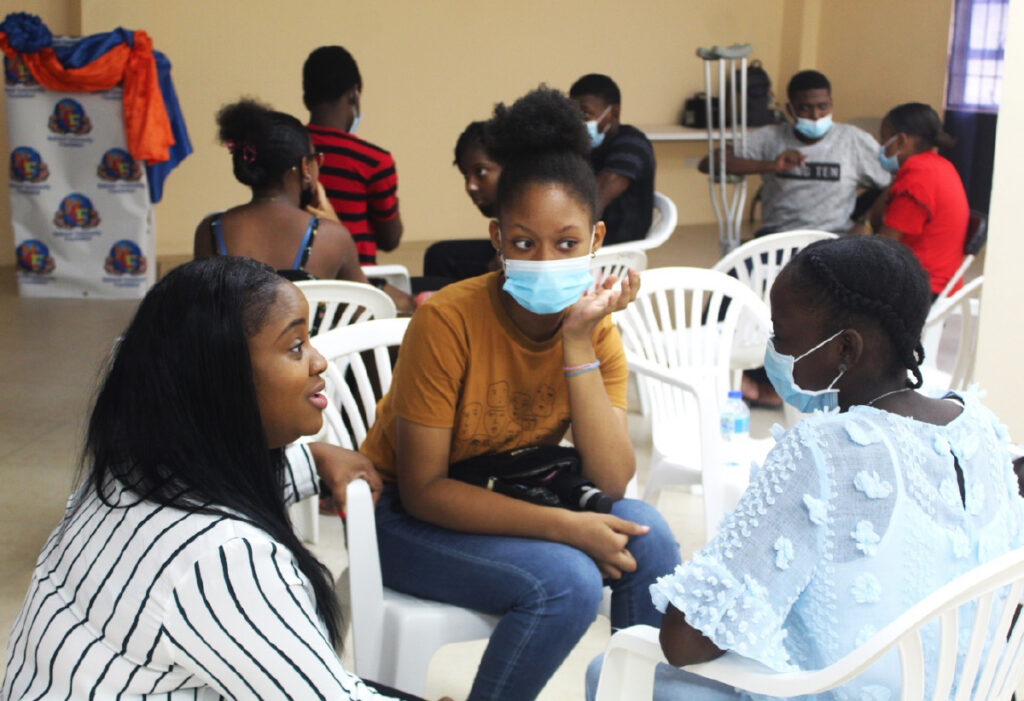Twenty-one beneficiaries from the National Community Foundation’s scholarship programme benefitted from a four-hour-long workshop last Friday (August 12) that addressed the worrisome act of bullying.
Held in the Saint Lucia Workers’ Credit Union Limited building on Bourbon Street, Castries, the workshop aimed to equip students with the knowledge they need to recognize, prevent and react to bullying.
Bullying is unwanted, aggressive behaviour among school-aged children that involves a real or perceived power imbalance. The behavior is repeated, or has the potential to be repeated, over time. Both children who are bullied and who bully others may have serious, lasting problems.
The workshop was facilitated by Janine Palm, of the Serieux Foundation, which promotes awareness in young people regarding identity, dreams and aspirations with education, social media safety, positive relationships, and leadership-mentoring programmes. The Serieux Foundation also provides sustainability for the community and parents.
Palm engaged the students in interactive group activities that allowed them to learn about each other, compliment each other, and presented scenarios in which they were expected to make positive choices.
“I understand that many young people don’t get an opportunity to hear any type of positive language, not even in schools or at home,” said Palm at the conclusion of the exercise. “So what better way to implement this than within a session targeting issues around what is actually going on in young people’s lives?”
According to Palm, bullying ties in to many social issues in a society. Therefore, she urges parents and teachers to recognize the signs of bullying to prevent its long-term damage in children.
“Your child being isolated and not going outside is one of the signs,” she said. “Your child not socializing or coming home saying they have no friends. Or when you drop them off or pick them up at school, you notice they’re often by themselves. Parents need to observe their children and listen effectively to them when they speak. Talk to your children and have an open relationship with them so they can be open and honest with you.”
She added: “Check your child’s social media because a lot of bullying happens online. If your child has WhatsApp or Instagram, get access to it. Go through their messages, check their pages, read the comments…You have to be observant. You have to be a FBI agent when you’ve got a child. This is the era of social media, so you can’t mess about.”
Her advice to children feeling bullied: “Tell a teacher. If your teacher does nothing about it, speak to the school’s guidance counselor, speak to your parents, and speak to someone in your community. Find a youth worker in your community or your social transformation officer. Get in contact with an organization that you feel can make a difference, including the national suicide helpline.”

Sasha Polius, Youth Worker in the Ministry of Youth Development and Sports, was also a co-facilitator at Friday’s session. She said the exercise was timely and well needed by the youngsters.
“I think we targeted the right age group because early intervention is always good,” said Polius. “Today was a good example of the practical use of early intervention. I think there was an impact made on the children by the activity.”
Polius said many people don’t really understand how detrimental bullying is, neither do they understand the magnitude of bullying that many children face.
“It’s so prevalent in all schools,” she said. “Some people think that it’s a small thing. Bullying is sometimes masked as joking around, so people who are being bullied often think it’s just joking around, and don’t take it seriously until they start feeling the consequences of being bullied.”
According to Polius, the most common forms of bullying children face are verbal abuse and cyber-bullying. In some cases of physical abuse, she said, children go home with injuries. As such, addressing the detrimental practice of bullying requires serious intervention.
“It’s something that we need to start tackling head-on and more aggressively by going to schools and trying to educate our young people on the importance of being kind to each other and what bullying can lead to,” Polius said.
Meanwhile, Government Minister and Soufriere MP, Hon. Emma Hippolyte, shared with the students her observations of a society in which people generally focus on themselves, often resulting in acts of violence against each other, adding that greed is a major factor.
“There is also a lot of anger among the youth, that’s what I’m seeing,” said Hon. Hippolyte, the Brian Bernard Memorial Fund Donor. “And if that is what is reflected, people don’t even think anymore; it’s like act first, and then reflect on what I have done. So there’s the issue of not being able to control your emotions.”
Hon. Hippolyte said that through her interactions with young people, she notices a deep sense of self-pity, especially if they do not have the material things their friends do. Citing the NCF’s tagline – “Caring by Sharing” — she noted that the late Brian Bernard had a great love for and cared for people, and encouraged the youngsters to be caring to each other.
“Mr. Bernard was a police officer who embodied much of these virtues,” Hon. Hippolyte told the students. “When we had our very first NCF Telethon, he believed in what we were doing and made a substantial contribution. After his passing, we felt that we should have the Virtues Programme in his memory.”
She added: “I want to encourage you, young people, that you can be the best that you can. There’s the intelligence that you were born with, but you must couple that with the soft skills, the virtues. You can be as intelligent as the wind, (but) if you do not have the right attitude to go with it, then it’s not going to take you to the altitude that you ought to reach.”
The annual lecture is named after former Police Commissioner, Brian Bernard, who retired on August 12, 2003, after serving in the Royal Saint Lucia Police Force (RSLPF) with distinction for over three decades.
Bernard was born on August 12, 1948, and enlisted in the RSLPF on August 16, 1968. He served in many capacities before being appointed Commissioner of Police on March 1, 2001. His career in the RSLPF was described as being one of dedication, commitment, loyalty, and respect for authority. He died in September 2003 at age 55.
The Brian Bernard Memorial Fund was established in his honour on August 12, 2004, for his contribution to humanity. The Fund is administered by the NCF and focuses on enforcing and/or enhancing ethical behaviour and human and Christian values. Since it was first held in 2005, the lecture has been hosted annually by the NCF from donations to the Fund.
Among the Fund’s objectives is strengthening ethics within communities by inspiring people and institutions to act ethically towards each other. This is done through education, advocacy and research.
One way to achieve this objective is to offer educational opportunities geared towards building one’s character to become better persons and community members. The Virtues Program, which was introduced as the bedrock of this Fund, is intended to provide empowering strategies that inspire the practice of virtues in everyday life, including the classroom.
“The concept of the Virtues Project is that if you teach people to speak, act and treat each other respectfully and virtuously, it would engender positive behaviours that would redound to the elimination of many of the socio-economic issues we see arising in our society,” NCF Executive Director, Michelle Phillips, said. “A significant part of the NCF mandate is to implement and fund programs that seek to eliminate socio-economic issues, among other things and The Virtues Project is significant tool which lends itself to achieving this mandate.”
Historically, the NCF would host a Brian Bernard Memorial Lecture annually, whereby a featured guest would speak on a particular topic – not necessarily solely on the virtues. In 2018, the lecture targeted Forms 4 and 5 students in the NCF’s scholarship programme.













